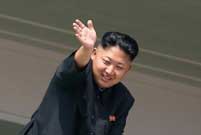National Day visitors to Tian'anmen Square, the Chinese capital landmark, will see smaller and simpler parterres than in previous years.
Parterre decorations are usually an important part of preparations for National Day, which falls on Oct. 1, and those in Tian'anmen Square are major tourist attractions.
This year, however, in a bid to implement the central leadership's guidelines on curbing extravagance, the city government will slash its spending on decorations, said Yang Zhihua, an official with the Beijing Municipal Bureau of Landscape and Forestry, in an interview with Xinhua on Wednesday.
There will be an 18.2-meter-high parterre in the center of the square but no such plant arrangements on the sides, while those near the monument in the square will be smaller than usual, Yang said.
Ten parterres will also be set up along Chang'an Avenue, the city's main street, but none in front of any city government buildings, he said.
"We have selected more flowers of local species that survive Beijing's autumn weather and bloom longer," the official explained. "In some locations, we will replace flowers with green plants. These measures will reduce the maintenance cost and save manpower."
The country is in the middle of a campaign to boost ties between officials and the public and exorcise undesirable work styles such as formalism, bureaucracy, hedonism and extravagance.
Last week, the Communist Party of China Central Commission for Discipline Inspection issued a circular urging officials to refrain from luxurious banquets and gift-giving ahead of the Mid-Autumn Festival, a traditional mooncake-eating occasion that falls on Sept. 19 this year, and the National Day holidays from Oct. 1 to 7.
China Central Television, the country's national TV network, also cut half of its festival evening galas from September to December in response to the campaign.
The anti-extravagance efforts have affected a number of national political and social events.
The annual parliamentary session in March also adopted a series of measures to ban extravagance and formalism. There were no flowers used to decorate lawmakers' hotel rooms and no welcoming ceremonies held at airport or railway stations, while traffic controls to facilitate lawmakers' commutes were strictly limited.
Business for liquor, flower and luxury gift shops, as well as high-end restaurants, has soured since the party and government cut their spending.
Tourists seemed not to be bothered by the toning down of decorations in Tian'anmen Square.
"I would not mind if there are fewer flowers in the square. I prefer simple but elegant decorations," said a 67-year-old lady surnamed Li who was touring the square with seven members of her family from the neighboring city of Tianjin.
"National Day is a festival for all Chinese. What we need is a festive atmosphere," she told Xinhua.
Li herself has felt the changes caused by the campaign as her son, working for a public institution, now eats out less and has fewer meetings.
Mr. Zhang, a company employee visiting the square on the sideline of his business trip in Beijing, expressed similar views to Li.
"A good atmosphere is more important than the size and amount of flower decoration," he said.
 DPRK holds military parade to mark 65th founding anniv.
DPRK holds military parade to mark 65th founding anniv. Highlights of MAKS 2013 Int'l Aviation and Space Show
Highlights of MAKS 2013 Int'l Aviation and Space Show  10th China-ASEAN Expo opens in Nanning
10th China-ASEAN Expo opens in Nanning Eagle Boy takes to sky to break another record
Eagle Boy takes to sky to break another record 12-year-old boy becomes pillar of the family
12-year-old boy becomes pillar of the family Eye-gouged boy receives blind rehabilitation in Shanxi
Eye-gouged boy receives blind rehabilitation in Shanxi Top 10 naked hotels in the world
Top 10 naked hotels in the world The most gorgeous Chinese women in the eyes of foreigners
The most gorgeous Chinese women in the eyes of foreigners A collection of bizarre rooftop buildings around China
A collection of bizarre rooftop buildings around China Residences of the royal house of Savoy
Residences of the royal house of Savoy China's frigate 'Bengbu'in fire training
China's frigate 'Bengbu'in fire training Fresh students 'forced' to register in university independently
Fresh students 'forced' to register in university independently 2013 Taiwan Int'l Tourism Expo kicks off in Taipei
2013 Taiwan Int'l Tourism Expo kicks off in Taipei Photo story: Take a gap year
Photo story: Take a gap year Nokia's Global Headquarters: visiting a declining empire
Nokia's Global Headquarters: visiting a declining empireDay|Week|Month